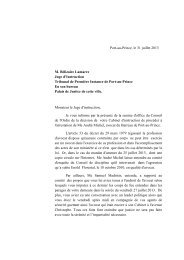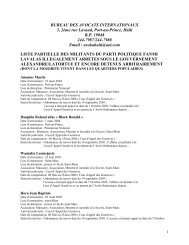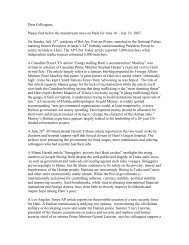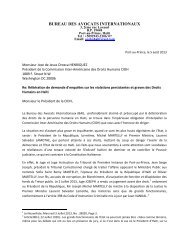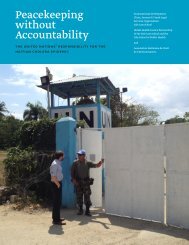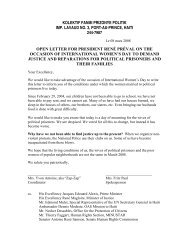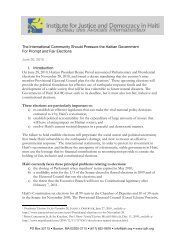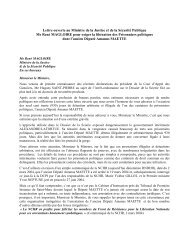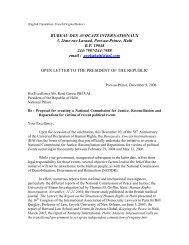affidavit of brian concannon jr., esq. in support of asylum
affidavit of brian concannon jr., esq. in support of asylum
affidavit of brian concannon jr., esq. in support of asylum
- No tags were found...
You also want an ePaper? Increase the reach of your titles
YUMPU automatically turns print PDFs into web optimized ePapers that Google loves.
other former soldiers and Police Nationale d'Haïti (PNH) <strong>of</strong>ficers, began tra<strong>in</strong><strong>in</strong>g <strong>in</strong> theDom<strong>in</strong>ican Republic. In 2001, the BAI received several reports that Mr. Philippe rema<strong>in</strong>ed<strong>in</strong> contact with current PNH <strong>of</strong>ficers, and was collaborat<strong>in</strong>g with them to plan attacks aga<strong>in</strong>stHaiti’s civilian government. In fact, Mr. Philippe’s group attacked the police academy andseveral police stations on July 28, 2001, kill<strong>in</strong>g several <strong>of</strong>ficers who resisted. That December17, Mr. Philippe’s group organized an attack aga<strong>in</strong>st the National Palace. The group seizedthe Palace police communications, and told all <strong>of</strong>ficers to <strong>support</strong> them or be shot. Loyal<strong>of</strong>ficers eventually repulsed the attack, but one was killed. Both attacks benefited fromsignificant help from <strong>in</strong>side the police force, and <strong>in</strong> both cases disloyal <strong>of</strong>ficers impeded the<strong>in</strong>vestigations.12. In the meantime, political tensions <strong>in</strong> Haiti rose, as members <strong>of</strong> the opposition openly calledfor the forced removal <strong>of</strong> President Aristide. Opponents <strong>of</strong> President Aristide began attack<strong>in</strong>gpeople believed to be <strong>support</strong>ers <strong>of</strong> Lavalas, the movement led by President Aristide.Violence aga<strong>in</strong>st Lavalas <strong>support</strong>ers <strong>in</strong>creased. In many cases, houses were attacked and theircontents burned. In late 2003, a prosecutor I worked with had his house burned down, bygovernment opponents. He lost most <strong>of</strong> his belong<strong>in</strong>gs, <strong>in</strong>clud<strong>in</strong>g his law books, legal papersand a small community radio station. Two BAI clients, both poor, had their houses burnedbecause <strong>of</strong> their <strong>support</strong> for Lavalas <strong>in</strong> 2003.13. Haitian society <strong>in</strong> general became <strong>in</strong>creas<strong>in</strong>gly polarized. People who had tried to rema<strong>in</strong>neutral were <strong>in</strong>creas<strong>in</strong>gly forced to choose a side- both camps adopted a “you are with us oryou are aga<strong>in</strong>st us” attitude.14. In February 2004, the <strong>in</strong>surgency began a major campaign, attack<strong>in</strong>g and tak<strong>in</strong>g cities andtowns <strong>in</strong> the north <strong>of</strong> Haiti. Each time the <strong>in</strong>surgency attacked a city, it released all theprisoners held <strong>in</strong> jail, some <strong>of</strong> whom jo<strong>in</strong>ed the <strong>in</strong>surgency. Often the <strong>in</strong>surgents executedpolice and other <strong>of</strong>ficials, and prom<strong>in</strong>ent <strong>support</strong>ers <strong>of</strong> the elected government or Lavalasparty. The <strong>in</strong>surgents publicly declared that they would kill Lavalas <strong>support</strong>ers and <strong>of</strong>ficialsand police who would not jo<strong>in</strong> them, and they have made good on that promise.15. Many <strong>of</strong> the <strong>in</strong>surgency’s leaders were implicated <strong>in</strong> human rights violations aga<strong>in</strong>st theLavalas movement dur<strong>in</strong>g the 1991-1994 de facto dictatorship. For example, JodelChambla<strong>in</strong> was the second <strong>in</strong> command <strong>of</strong> the FRAPH death squad. Jean Pierre, aliasTatoune, was a local FRAPH leader <strong>in</strong> Gonaives. Both had been convicted for murder <strong>in</strong> theRaboteau trial.16. The <strong>in</strong>surgents worked closely with less organized groups. They found some allies <strong>in</strong> theprisoners they released from jail. They also worked with local political groups, some <strong>of</strong>which provided <strong>in</strong>formants to show the <strong>in</strong>surgents the homes <strong>of</strong> Lavalas sympathizers.Sometimes political groups carried out their own attacks, under the <strong>in</strong>surgents’ protection.17. Eventually, the <strong>in</strong>surgents took over all <strong>of</strong> Haiti. The elected government was replaced by anunconstitutional <strong>in</strong>terim government, which unleashed another wave <strong>of</strong> repression aga<strong>in</strong>st thedemocracy <strong>support</strong>ers, especially Lavalas movement. Although the arrival <strong>of</strong> <strong>in</strong>ternational3
forces eventually limited their activities, they were never systematically disarmed,demobilized or prosecuted.Violence <strong>in</strong> Haiti from 2004-200618. Violence <strong>in</strong> Haiti dur<strong>in</strong>g the two years follow<strong>in</strong>g February 2004 has been well-documented,by Amnesty International, teams from Harvard and the University <strong>of</strong> Miami Law Schools,Refugees International, the Committee to Protect Journalists and the International CrisisGroup, among others. Although some <strong>of</strong> the violence <strong>in</strong> Haiti is non-political, all <strong>of</strong> thereports identify perceived engagement <strong>in</strong> political activity as a significant risk factor forbecom<strong>in</strong>g a victim <strong>of</strong> violence.19. The persecution <strong>of</strong> Lavalas <strong>support</strong>ers <strong>in</strong>cluded mass kill<strong>in</strong>gs. The Port-au-Pr<strong>in</strong>ce morguereported dispos<strong>in</strong>g <strong>of</strong> over 1000 bodies <strong>in</strong> March 2004 alone, many bear<strong>in</strong>g signs <strong>of</strong>summary execution. The persecution <strong>in</strong>cluded torture by both the <strong>in</strong>surgents, who <strong>of</strong>tenmutilated their victim’s bodies before kill<strong>in</strong>g them, and the police, who used torture as an<strong>in</strong>terrogation technique. The persecution was carried out by a wide spectrum <strong>of</strong> Lavalasopponents, <strong>in</strong>clud<strong>in</strong>g the <strong>in</strong>surgents <strong>in</strong> areas they control, Haitian police, and even topgovernment <strong>of</strong>ficials such as the M<strong>in</strong>ister <strong>of</strong> Justice.20. A mortality study for Port-au-Pr<strong>in</strong>ce published <strong>in</strong> The Lancet <strong>in</strong>dicates the overall scale <strong>of</strong>the violence. The study calculated that over 8,000 people were killed <strong>in</strong> the first 22 months <strong>of</strong>the Interim Government <strong>of</strong> Haiti (IGH) (March 2004-December 2005), almost half <strong>of</strong> themfor political reasons, and that there were high levels <strong>of</strong> assault, especially sexual assault, anddestruction <strong>of</strong> property. Members <strong>of</strong> opposition parties were reported to be responsible for8.5% <strong>of</strong> physical assaults, and 12.5% <strong>of</strong> crimes aga<strong>in</strong>st property.21. The persecution also <strong>in</strong>cluded the illegal arrest and detention <strong>of</strong> activists, especially Lavalas<strong>support</strong>ers. Dissidents were rout<strong>in</strong>ely arrested without a warrant and kept <strong>in</strong> jail without ahear<strong>in</strong>g and without access to the courts. Former Prime M<strong>in</strong>ister Yvon Neptune, arrested <strong>in</strong>June 2004, was not released until July, 2006. Rev. Gerard Jean-Juste, a prom<strong>in</strong>ent activistpriest, spent over seven months <strong>in</strong> jail <strong>in</strong> 2004, 2005 and 2006 on trumped-up charges. Hewas eventually released <strong>in</strong> order to obta<strong>in</strong> treatment for leukemia, but the case aga<strong>in</strong>st himhas still not been dismissed, even though the prosecution conceded that the charges aga<strong>in</strong>sthim are without merit at a hear<strong>in</strong>g <strong>in</strong> April 2007.A Return <strong>of</strong> Politically Motivated Rapes after 200422. The persecution under the IGH also <strong>in</strong>cluded a return <strong>of</strong> politically-motivated rapes. TheLancet study concluded that 35,000 women were raped between March 2004 and December2006 <strong>in</strong> Port-au-Pr<strong>in</strong>ce alone. Almost 12% <strong>of</strong> the perpetrators were identified as right-w<strong>in</strong>gpolitical actors. Although the Lancet study’s conclusions on rape were controversial, and it ispossible that the conclusion <strong>of</strong> 35,000 is high, it is clear that there was an enormous amount<strong>of</strong> politically-motivated rape dur<strong>in</strong>g that time <strong>in</strong> Haiti.4
23. The <strong>in</strong>stitutions that should have protected Haiti’s citizens from political violence wereactually major contributors to the problem. The Lancet study calculated that police <strong>of</strong>ficerswere responsible for 27% <strong>of</strong> the kill<strong>in</strong>gs, and 20% <strong>of</strong> the assaults dur<strong>in</strong>g the study period, andalmost 14% <strong>of</strong> the sexual assaults. Human rights groups like Amnesty Internationaldocumented a pattern <strong>of</strong> illegal, politically-motivated arrests by the police.24. The Haitian police force was sharply reduced after February 2004, because many <strong>of</strong>ficersconsidered loyal to the ousted constitutional government were killed or purged. The purged<strong>of</strong>ficers were replaced with an <strong>in</strong>flux <strong>of</strong> former soldiers, many <strong>of</strong> whom had participated <strong>in</strong>the rebellion. This replacement violated police regulations for recruitment and promotion. Italso swelled the force with a large number <strong>of</strong> <strong>of</strong>ficers with no civilian police experience ortra<strong>in</strong><strong>in</strong>g, who were not accountable to the <strong>of</strong>ficial police hierarchy or rules.25. Neither the police nor the judiciary effectively <strong>in</strong>vestigate or prosecute political attacks,especially rapes. I am not aware <strong>of</strong> a s<strong>in</strong>gle prosecution for political rape ever <strong>in</strong> Haiti.26. The court system has <strong>of</strong>ten been an <strong>in</strong>strument <strong>of</strong> repression <strong>in</strong>stead <strong>of</strong> a protection aga<strong>in</strong>st it.The IGH forced out many judges, and replaced them with hand-picked successors, will<strong>in</strong>g toobey the government’s whims rather than the rule <strong>of</strong> law. The most notorious examplehappened <strong>in</strong> December, 2005, when the Prime M<strong>in</strong>ister fired five Supreme Court judges whohad issued an unfavorable rul<strong>in</strong>g, and replaced them with his own candidates. Such<strong>in</strong>terference with judicial <strong>in</strong>dependence is as unconstitutional <strong>in</strong> Haiti as it would be <strong>in</strong> theU.S.27. An unprecedented level <strong>of</strong> violent non-political crime has accompanied Haiti’s politicalviolence over the last three years. There has been a wave <strong>of</strong> kidnapp<strong>in</strong>gs, murders, theft andviolence, which the police have proven powerless to combat.28. The common crime has two connections with the political violence. First, <strong>in</strong> some cases it isconducted by groups that orig<strong>in</strong>ally armed themselves for political reasons. Second, thecommon crime can be a convenient cover for political crime. It would be easy to arrange fora political opponent to be killed, and disguise it as an ord<strong>in</strong>ary murder.29. The 2006 elections and the <strong>in</strong>auguration <strong>of</strong> an elected President and legislature <strong>in</strong> May 2006were held without widespread violence, and the human rights and security conditions <strong>in</strong> Haitidid improve somewhat. The new government has ended the practice <strong>of</strong> systematicallyattack<strong>in</strong>g political opponents. But several dangers <strong>of</strong> political persecution have survived thedemocratic transition.Perpetrators <strong>of</strong> Past Persecution Rema<strong>in</strong> At Large <strong>in</strong> Haiti30. The first rema<strong>in</strong><strong>in</strong>g danger is the fact that the perpetrators <strong>of</strong> past persecution rema<strong>in</strong> atlarge. The IGH or the rebels freed every person imprisoned under the democraticgovernments <strong>in</strong> connection with human rights violations <strong>in</strong> February and March 2004. The<strong>in</strong>surgency’s leaders- <strong>in</strong>clud<strong>in</strong>g those were themselves implicated <strong>in</strong> human rights violationsdur<strong>in</strong>g the 1991-1994 de facto dictatorship- are at large. This <strong>in</strong>cludes Jodel Chambla<strong>in</strong>, the5
second <strong>in</strong> command <strong>of</strong> the FRAPH death squad, which was a successor to the macoutes, andJean Pierre, alias Tatoune, a local FRAPH leader <strong>in</strong> Gonaives before 1994. Both had beenconvicted for murder <strong>in</strong> the Raboteau massacre trial <strong>in</strong> 2000. Mr. Chambla<strong>in</strong> even ran for theHouse <strong>of</strong> Deputies <strong>in</strong> 2006.31. Guy Philippe, the rebel leader and former soldier, set up a military base that he laterconverted to a political party, the FRN (National Reconstruction Front). Although heapparently provided a few token weapons to a UN disarmament program, he and his soldiersare believed to reta<strong>in</strong> significant weapons. Mr. Philippe ran as a candidate <strong>in</strong> the 2006Presidential elections.32. The U.S. Drug Enforcement Adm<strong>in</strong>istration attempted to arrest Mr. Philippe <strong>in</strong> Haiti <strong>in</strong>July 2007, and aga<strong>in</strong> on March 25, 2008. Both times Mr. Philippe eluded capture, and soonwent on the radio to demonstrate that he was “untouchable”. Mr. Philippe’s ability to eludetwo DEA arrest operations <strong>in</strong>dicates that he has extremely good allies with<strong>in</strong> the HaitianNational Police. Guy Philippe, <strong>in</strong> an <strong>in</strong>terview published <strong>in</strong> March 2007, admitted that some<strong>of</strong> his former soldiers are still <strong>in</strong> the police force.33. On January 13, 2009, Mr. Philippe registered as a candidate for the Senate electionsscheduled for April 2009. Despite be<strong>in</strong>g wanted on drug charges, Mr. Philippe was able toconduct his registration at the electoral <strong>of</strong>fice <strong>in</strong> the city <strong>of</strong> Jeremie. Accord<strong>in</strong>g to the Haitianpress, he was accompanied by six armed men, two <strong>of</strong> whom appeared to be wear<strong>in</strong>g policeuniforms. His candidacy was later rejected, on technical grounds, by the electoral counsel.34. Franck Roma<strong>in</strong>, a former mayor <strong>of</strong> Port-au-Pr<strong>in</strong>ce, spent 16 years <strong>in</strong> exile flee<strong>in</strong>g formalcharges that he masterm<strong>in</strong>ded the 1988 “St. Jean Bosco Massacre.” St. Jean Bosco was thechurch <strong>of</strong> Jean-Bertrand Aristide at the time, and the focal po<strong>in</strong>t for pro-democracyorganiz<strong>in</strong>g. On September 11, 1988, thugs reportedly under the control <strong>of</strong> Mr. Roma<strong>in</strong>attacked the church dur<strong>in</strong>g a mass celebrated by Fr. Aristide, kill<strong>in</strong>g many <strong>of</strong> his <strong>support</strong>ersand destroy<strong>in</strong>g the church. Mr. Roma<strong>in</strong> ran for President <strong>in</strong> 2006. He lives openly <strong>in</strong> Haiti,and is widely believed to be a candidate for the 2010 Presidential elections.35. The former <strong>in</strong>surgents were never systematically disarmed, so they reta<strong>in</strong> their ability tostrike at their enemies. Although the UN Mission proposed several disarmament programs,none <strong>of</strong> them led to significant disarmament <strong>of</strong> the former <strong>in</strong>surgents.36. The thugs <strong>in</strong>volved <strong>in</strong> persecution dur<strong>in</strong>g the IGH’s reign have not been disarmed or pursuedby the police for their crimes. In many cases, they cont<strong>in</strong>ue to <strong>in</strong>timidate, and even killpolitical opponents.37. On April 14, 2007, Johnson Edouard, a Lavalas grassroots leader and journalist, was killedby gunmen who entered his house at night. The prime suspect <strong>in</strong> the case is WilfortFerd<strong>in</strong>and, a.k.a “Ti Will,” a leader <strong>in</strong> the 2004 <strong>in</strong>surgency, was arrested <strong>in</strong> May 2007. But hewas charged with coca<strong>in</strong>e possession, not Mr. Edouard’s murder. On September 21, 2006,human rights activist Esterne Bruner was assass<strong>in</strong>ated near his home <strong>in</strong> the Grande Rav<strong>in</strong>esection <strong>of</strong> Port-au-Pr<strong>in</strong>ce, <strong>in</strong> what is widely considered a political kill<strong>in</strong>g.6
38. On June 27, 2008, two leaders <strong>in</strong> the National Popular Party, Prad Remy Jean Vernet andAdrien Michel, were killed near the town <strong>of</strong> St. Raphael while they were visit<strong>in</strong>g the town <strong>in</strong>the course <strong>of</strong> their political work. Although the circumstances <strong>of</strong> the kill<strong>in</strong>g are contested, thetwo men’s families and <strong>support</strong>ers believe they were killed for political reasons.39. On January 2, 2008, members <strong>of</strong> the former Haitian army marched <strong>in</strong> Cap Haitian, the capitol<strong>of</strong> the North Department, as a show <strong>of</strong> force, and to push their demands for a re<strong>in</strong>statement <strong>of</strong>the army. Most Haitians fear the army, which had never successfully defended the countryaga<strong>in</strong>st foreign attack, but regularly engaged <strong>in</strong> oppress<strong>in</strong>g the people and overthrow<strong>in</strong>g thegovernment. The army had been demobilized by President Aristide <strong>in</strong> 1994. On July 28,2008, members <strong>of</strong> the army took over several government build<strong>in</strong>gs, <strong>in</strong>clud<strong>in</strong>g one <strong>in</strong> CapHaitian. Although no shots were fired, the former soldiers only left the build<strong>in</strong>gs after be<strong>in</strong>gforced out by UN troops.The Haitian Police Force is Corrupt, Unreliable, and Does Not Provide Mean<strong>in</strong>gfulProtection to Persecuted Persons40. The second rema<strong>in</strong><strong>in</strong>g danger for political persecution is the unreliability <strong>of</strong> the policeforce, because <strong>of</strong> former <strong>in</strong>surgents illegally <strong>in</strong>tegrated <strong>in</strong>to the force under the IGH, and ahigh level <strong>of</strong> crim<strong>in</strong>ality with<strong>in</strong> the force. The constitutional authorities have struggled topurge the former soldiers that the IGH illegally <strong>in</strong>tegrated <strong>in</strong>to police ranks. The police forceis sharply reduced already while common crime is very high, so the government is reluctantto take more police, even brutal or crooked ones, <strong>of</strong>f the streets.41. Police have also been implicated <strong>in</strong> common crime. The Police force’s Director General,Mario Andresol, publicly conceded that a quarter <strong>of</strong> his <strong>of</strong>ficers might have been <strong>in</strong>volved <strong>in</strong>crim<strong>in</strong>al activities. The head <strong>of</strong> the Judicial Police, Haiti’s ma<strong>in</strong> <strong>in</strong>vestigative unit, MichaelLucius, was fired and arrested <strong>in</strong> November 2006, for his <strong>in</strong>volvement <strong>in</strong> kidnapp<strong>in</strong>gs. Hewas released <strong>in</strong> December, 2007, aga<strong>in</strong>st the protest <strong>of</strong> the judge who issued the orig<strong>in</strong>alarrest order.42. In February 2008 Human Rights Watch issued a report f<strong>in</strong>d<strong>in</strong>g that “police lawlessnesscont<strong>in</strong>ues to contribute to overall <strong>in</strong>security. The HNP is largely <strong>in</strong>effective <strong>in</strong> prevent<strong>in</strong>g and<strong>in</strong>vestigat<strong>in</strong>g crime. HNP members are responsible for arbitrary arrests, as well as excessiveand <strong>in</strong>discrim<strong>in</strong>ate use <strong>of</strong> force. They also face credible allegations <strong>of</strong> <strong>in</strong>volvement <strong>in</strong>crim<strong>in</strong>al activity, <strong>in</strong>clud<strong>in</strong>g drug traffick<strong>in</strong>g, as <strong>in</strong>dicated by the arrest <strong>of</strong> five HNP <strong>of</strong>ficers <strong>in</strong>a coca<strong>in</strong>e seizure <strong>in</strong> May. Although the HNP has participated <strong>in</strong> some tra<strong>in</strong><strong>in</strong>g sessions, thepolice cont<strong>in</strong>ue to suffer from severe shortages <strong>of</strong> personnel and equipment. Police perpetrateabuses with impunity.”43. On June 29, 2008, 13 prisoners escaped at once from Haiti’s Carrefour prison. By mid-July,none <strong>of</strong> them had been re-arrested. Many analysts asserted that the escapees likely had helpfrom prison <strong>of</strong>ficials.7
44. On July 10, 2008, the head <strong>of</strong> the <strong>in</strong>vestigative police <strong>of</strong> the Northern Department <strong>of</strong> Haiti,Darnley Louis Jean, was arrested for participat<strong>in</strong>g <strong>in</strong> kidnapp<strong>in</strong>gs <strong>in</strong> the area. An arrestwarrant was issued for one <strong>of</strong> his subord<strong>in</strong>ates as well.45. On November 12, 2008, police <strong>in</strong> the city <strong>of</strong> Port-de-Paix searched the house <strong>of</strong> Ala<strong>in</strong> Desir,who had been arrested and deported to Florida on drug charges. Accord<strong>in</strong>g to government<strong>of</strong>ficials, several million dollars disappeared dur<strong>in</strong>g the search. On January 11, 2009, thepolice force’s Assistant Departmental Director <strong>of</strong> the Northwest Department (which <strong>in</strong>cludesPort-de-Paix), Jean Raymond Philippe died under suspicious circumstances follow<strong>in</strong>g histransportation to Port-au-Pr<strong>in</strong>ce for question<strong>in</strong>g by Haitian and U.S. police regard<strong>in</strong>g themiss<strong>in</strong>g money.46. On November 28, 2008, Monique Pierre, the girlfriend <strong>of</strong> Ernst Dorfeuille, the PoliceCommissioner <strong>of</strong> Gonaives, a city <strong>in</strong> Haiti was kidnapped and killed. The <strong>in</strong>vestigationrevealed that she had a large amount <strong>of</strong> cash <strong>in</strong> her home, and l<strong>in</strong>ks to drug dealers. Thepolice found enough l<strong>in</strong>ks with Commissioner Dorfeuille to arrest him <strong>in</strong> early December2008.The Haitian Judicial System is Corrupt and Impunity is Widespread47. The third rema<strong>in</strong><strong>in</strong>g danger for political persecution is the justice system, which stillconta<strong>in</strong>s prosecutors and judges placed there by the IGH, <strong>in</strong>clud<strong>in</strong>g the illegal Supreme Courtjustices. These judges have demonstrated a will<strong>in</strong>gness to cont<strong>in</strong>ue persecut<strong>in</strong>g politicalopponents. Although dozens <strong>of</strong> the IGH’s political prisoners have been released s<strong>in</strong>ce thereturn <strong>of</strong> democracy, others rema<strong>in</strong> <strong>in</strong> prison, with no progress made on their cases.48. The case aga<strong>in</strong>st Yvon Neptune, the former Prime M<strong>in</strong>ister and Senate President, is stilloutstand<strong>in</strong>g, and he could be immediately rearrested at any time. Although an appeals courtordered the case aga<strong>in</strong>st him dismissed <strong>in</strong> April 2007, justice <strong>of</strong>ficials refuse to serve theorder, so it is not f<strong>in</strong>al. In June, 2008, the Inter-American Court <strong>of</strong> Human Rights issued ab<strong>in</strong>d<strong>in</strong>g order for Haiti to stop the illegal pursuit <strong>of</strong> Mr. Neptune, but the government has, s<strong>of</strong>ar, ignored the order.49. The case aga<strong>in</strong>st former Deputy Amanus Maette is likewise outstand<strong>in</strong>g. He was givenprovisional release <strong>in</strong> April, 2008, but the case has not advanced at the trial level s<strong>in</strong>ceOctober, 2005.50. Although the judiciary has kept political prisoners <strong>in</strong> jail, it has made no effort to recaptureany <strong>of</strong> the people convicted <strong>of</strong> persecution dur<strong>in</strong>g the de facto dictatorship or other period.Jean-Tatoune was convicted <strong>in</strong> absentia <strong>in</strong> the Raboteau case, and although he has the rightto a new trial, under Haitian law he should be arrested and held until either acquitted at trialor given pre-trial release. Three members <strong>of</strong> the 1991-1994 de facto High Command- Col.Carl Dorelien, Col. Hebert Valmond and Major General Jean-Claude Duperval- were alllikewise convicted at the Raboteau trial, and all three were deported from the U.S. for theirhuman rights violations. They escaped from jail <strong>in</strong> March 2004, and although they arebelieved to be still <strong>in</strong> Haiti, none have been arrested.8
Haiti’s Political Situation is Unpredictable and Potentially Dangerous51. The fourth rema<strong>in</strong><strong>in</strong>g danger for political persecution is Haiti’s politics, which cont<strong>in</strong>ue tobe hotly contested, unpredictable, and potentially dangerous.52. Haiti’s current government is a weak one. No party won a majority <strong>of</strong> seats <strong>in</strong> Parliament <strong>in</strong>the 2006 elections, which forced the construction <strong>of</strong> two coalition governments. TheM<strong>in</strong>isters <strong>in</strong> the coalition governments have come from a variety <strong>of</strong> ideological perspectives,which has made the government <strong>in</strong>efficient at best, and <strong>of</strong>ten <strong>in</strong>effective and contentious.53. The first coalition government fell on April 13, 2008. Follow<strong>in</strong>g a week <strong>of</strong> sometimes violentprotests over food prices, the Senate adopted a vote <strong>of</strong> “no confidence” <strong>in</strong> the government,which led to the automatic resignation <strong>of</strong> the Prime M<strong>in</strong>ister.54. The government was not replaced for almost five months, until September 5, 2008, when theSenate approved President Préval’s third nom<strong>in</strong>ee, Michele Pierre-Louis. Even this approvalwas controversial: Ms. Pierre-Louis was nom<strong>in</strong>ated <strong>in</strong> June, and it took almost ten weeks <strong>of</strong>negotiations to obta<strong>in</strong> parliamentary approval. The nom<strong>in</strong>ation actually failed on the firstSenate vote on September 4, and only succeeded after a Senator who had voted aga<strong>in</strong>st it leftfor home, th<strong>in</strong>k<strong>in</strong>g the session was over. That Senator contested the f<strong>in</strong>al vote.55. A second potential source <strong>of</strong> political <strong>in</strong>stability <strong>in</strong> Haiti is the elections scheduled <strong>in</strong> 2009for every elected <strong>of</strong>fice <strong>in</strong> the country except President and some Senate seats. TheConstitution required an election for 1/3 <strong>of</strong> the Senate by the end <strong>of</strong> 2007. These electionshave not been held, over a year later. The Provisional Electoral Council (CEP) hasannounced that the elections will take place <strong>in</strong> April and June <strong>of</strong> 2009, but many observersbelieve that is unrealistic. The delays are the result <strong>of</strong> fundamental disagreements with<strong>in</strong> thecouncil and with<strong>in</strong> Haitian politics. These disagreements are similar to the disagreements thatled to aborted elections <strong>in</strong> 1997, contested elections <strong>of</strong> 2000, and the spiral<strong>in</strong>g polarizationand civil unrest that ultimately caused the 2004 coup d’état and massive political violence.The electoral council is “provisional” because twenty-two years after ratification <strong>of</strong> Haiti’s1987 Constitution, the steps to choose a Permanent Electoral Council have not been taken.56. On February 5, 2009, the CEP disqualified 40 <strong>of</strong> the 105 registered candidates for the Aprilsenate elections, <strong>in</strong>clud<strong>in</strong>g all Lavalas candidates. Follow<strong>in</strong>g a public outcry <strong>in</strong> Haiti, andcondemnation by Canada, the U.S. and other foreign governments, the CEP agreed toconsider appeals <strong>of</strong> this decision. On February 16, the CEP issued a new list that <strong>in</strong>cluded anadditional 13 candidates, but cont<strong>in</strong>ued to exclude all Lavalas party candidates.57. On March 9, 2009, a judge found the exclusion <strong>of</strong> all the Lavalas candidates to be illegal, andordered the CEP to re<strong>in</strong>state them. The CEP announced that it would not comply with thecourt’s decision, sett<strong>in</strong>g up a potential constitutional crisis.58. Most observers are confident that the Lavalas party would w<strong>in</strong> many <strong>of</strong> the seats at stake <strong>in</strong>the April elections. If the CEP tries to run elections without <strong>in</strong>clud<strong>in</strong>g Lavalas candidates,9
there is a very significant chance <strong>of</strong> violence between Lavalas <strong>support</strong>ers and police andelectoral <strong>of</strong>ficials, or <strong>support</strong>ers <strong>of</strong> other parties.59. In addition to the April/June elections, there are elections scheduled <strong>in</strong> November andDecember <strong>of</strong> this year for a third <strong>of</strong> the Senate seats, the entire Chamber <strong>of</strong> Deputies and all<strong>of</strong> the local elected <strong>of</strong>ficials, <strong>in</strong>clud<strong>in</strong>g mayors and community councils.60. The Senate is now miss<strong>in</strong>g 12 <strong>of</strong> its 30 members, and it struggles to obta<strong>in</strong> a quorum. Anyfour Senators can deprive the body <strong>of</strong> a quorum by leav<strong>in</strong>g the build<strong>in</strong>g, which makes itdifficult for the chamber to pass legislation. This has created a significant backlog <strong>of</strong>legislation, which will <strong>in</strong> turn <strong>in</strong>crease political unrest and raise the stakes for the nextelections. Other than last summer’s protracted consideration <strong>of</strong> the nom<strong>in</strong>ated PrimeM<strong>in</strong>ister, the Senate does not effectively handle controversial matters.61. Political strife has been violent <strong>in</strong> the past <strong>in</strong> Haiti, and it cont<strong>in</strong>ues to be so. On August 12,2007, Lov<strong>in</strong>sky Pierre-Anto<strong>in</strong>e, a prom<strong>in</strong>ent Lavalas activist and announced Senatecandidate <strong>in</strong> the upcom<strong>in</strong>g elections, was kidnapped. Mr. Pierre-Anto<strong>in</strong>e was a particularlyprom<strong>in</strong>ent opponent <strong>of</strong> the return <strong>of</strong> the Haitian armed forces. The day after hisdisappearance, his car was found abandoned, and the day after that his family received aransom demand. Although the family started negotiations, kidnappers cut <strong>of</strong>f contact onAugust 17, 2007. There have been no communications from the kidnappers or signs <strong>of</strong> Mr.Pierre-Anto<strong>in</strong>e s<strong>in</strong>ce then. The circumstances <strong>of</strong> the disappearance, Mr. Pierre-Anto<strong>in</strong>e’spr<strong>of</strong>ile and the course <strong>of</strong> the “negotiations” <strong>in</strong>dicate that Mr. Pierre-Anto<strong>in</strong>e was takenbecause <strong>of</strong> his political activities, and is most likely related to the upcom<strong>in</strong>g elections.62. Several <strong>in</strong>dividuals and organizations have compla<strong>in</strong>ed that the police are not vigorously<strong>in</strong>vestigat<strong>in</strong>g Mr. Pierre-Anto<strong>in</strong>e’s disappearance, <strong>in</strong>clud<strong>in</strong>g Amnesty International, the UNPeacekeep<strong>in</strong>g Force, and Mr. Pierre-Anto<strong>in</strong>e’s friends and family.63. Wilson Mesilien, who has replaced Mr. Pierre-Anto<strong>in</strong>e at the head <strong>of</strong> their grassrootsorganization, has been receiv<strong>in</strong>g threats that have forced him <strong>in</strong>to hid<strong>in</strong>g. AmnestyInternational has issued two urgent action alerts for his protection, <strong>in</strong>clud<strong>in</strong>g one on January9, 2008. Amnesty also notes that the government has not heeded its calls to provide Mr.Mesilien with protection.64. On October 28, 2007, Maryse Narcisse, one <strong>of</strong> the top Lavalas <strong>of</strong>ficials <strong>in</strong> Haiti, waskidnapped on her way home from a political meet<strong>in</strong>g. She was released a few days later,reportedly after a ransom was paid.65. In early November 2007, Guy Delva, a Haitian journalist who is a correspondent for Reutersand the BBC, fled the country follow<strong>in</strong>g s series <strong>of</strong> death threats. It has been reported that thethreats were the result <strong>of</strong> his revelations that Senator Boulos, one <strong>of</strong> the leaders <strong>of</strong> the anti-Lavalas movement <strong>in</strong> Haiti, was <strong>in</strong>eligible for the legislature because he has a foreign (U.S.)passport. Mr. Delva did later return to Haiti.10
66. It is likely that politics <strong>in</strong> Haiti will become even more hotly contested <strong>in</strong> the com<strong>in</strong>g monthsand years, due to the anticipated return <strong>of</strong> former President Jean-Bertrand Aristide, currently<strong>in</strong> exile <strong>in</strong> South Africa. President Aristide has announced a general <strong>in</strong>tention to return toHaiti when the conditions are right, and he has the constitutional right to return at will. Todate, President Aristide has not announced a date for his return, <strong>in</strong> deference to PresidentPréval’s wishes. President Préval has not stated that President Aristide is currently welcometo return.67. As President Aristide’s <strong>support</strong>ers become <strong>in</strong>creas<strong>in</strong>gly discontent with current governmentpolicies, there is an <strong>in</strong>creas<strong>in</strong>g mobilization for his return. On February 28, 2009 over 10,000people demonstrated <strong>in</strong> Port-au-Pr<strong>in</strong>ce for Aristide’s return. Several thousand attendedanother demonstration on March 9. If President Aristide returns, or if it appears likely that hewill return, opponents <strong>of</strong> Lavalas will likely try to block his return through violence and<strong>in</strong>timidation <strong>of</strong> Lavalas <strong>support</strong>ers.68. As <strong>of</strong> February 24, 2009, the Canadian M<strong>in</strong>istry <strong>of</strong> Foreign Affairs has a travel warn<strong>in</strong>grecommend<strong>in</strong>g that Canadians defer all unnecessary travel to Haiti. On January 28, 2009, theU.S. State Department issued a travel warn<strong>in</strong>g recommend<strong>in</strong>g that Americans defer allunnecessary travel to Haiti. Travel with<strong>in</strong> Haiti by U.S. <strong>of</strong>ficials has been restricted.The 2004 Elections Set a Dangerous Precedent for the Violent Overthrow <strong>of</strong> an ElectedGovernment69. The fifth rema<strong>in</strong><strong>in</strong>g danger for political persecution is the precedent <strong>of</strong> 2004- wherepolitical violence overthrew an elected government. This precedent will encourage those leftout <strong>of</strong> the government to seek power through violence. Although there have been some callsfor President Préval’s ouster, I have not seen evidence <strong>of</strong> actual preparations for this. But ifthe elections scheduled for 2009 are held and held fairly, and if, as expected, Lavalas w<strong>in</strong>sthem, it is highly likely that Lavalas opponents will attack the government and Lavalas<strong>support</strong>ers.Haiti Has Been Ravaged by Tropical Storms and Suffers from a Lack <strong>of</strong> Food Security70. The sixth rema<strong>in</strong><strong>in</strong>g danger is the potential from civil strife as a result <strong>of</strong> hunger anddamage from tropical storms. Haiti suffered food riots <strong>in</strong> April 2008 to protest rises <strong>in</strong> foodprices. For most Haitians, food takes up about 80% <strong>of</strong> the family budget. By some studiesHaitians suffer from one <strong>of</strong> the highest calorie deficits <strong>in</strong> the world already. When the price<strong>of</strong> food goes up precipitously for people already spend<strong>in</strong>g most <strong>of</strong> their money to buy<strong>in</strong>adequate amounts <strong>of</strong> food, there is little room to tighten their belt. As a result, if prices riseaga<strong>in</strong>, Haitians will become more desperate over food prices, with a high risk <strong>of</strong> widespreadviolence. The riots <strong>in</strong> April 2008 led to the downfall <strong>of</strong> the government and <strong>in</strong>cluded attackson UN troops, government build<strong>in</strong>gs and private property. Smaller demonstrations cont<strong>in</strong>uedup through August 2008.71. Dur<strong>in</strong>g three weeks <strong>in</strong> late August and early September 2008, Haiti was hit by fourconsecutive tropical cyclones, <strong>in</strong>clud<strong>in</strong>g two hurricanes. The storms left over 500 people11
killed, a million or more homeless, and devastated the country’s road and <strong>in</strong>frastructurenetwork. The storms devastated Haiti’s agriculture, kill<strong>in</strong>g up to 80% <strong>of</strong> the crops <strong>in</strong> someareas. The United Nations has estimated the destruction from the storms to be $1 billion,about 15% <strong>of</strong> Haiti’s annual Gross Domestic Product.72. The storms’ destruction <strong>of</strong> animals and plants have decreased food supply and raised foodprices <strong>in</strong> Haiti, at a time when people who lost everyth<strong>in</strong>g <strong>in</strong> the storms are even less able topay for food. This will lead Haiti <strong>in</strong>to an extremely dangerous and volatile situation,especially comb<strong>in</strong>ed with the political risk factors.I declare under penalty <strong>of</strong> perjury that the forego<strong>in</strong>g is true and correct. Executed on ___, 2009at Marshfield, Massachusetts.________________________________________Brian Concannon Jr., Esq.ADDENDUM:Excerpt from Brian Concannon’s Draft Book Chapter: Haitian Women’s Fight for GenderJustice. Submitted <strong>in</strong> <strong>support</strong> <strong>of</strong> XX, YY’s <strong>asylum</strong> application.HAITIAN WOMEN’S FIGHT FOR GENDER JUSTICEBrian Concannon Jr.On September 30, 1991, a military coup d’etat overthrew Haiti’s first democratically electedgovernment, and <strong>in</strong>itiated a three-year reign <strong>of</strong> terror. The military and its paramilitary alliesbrutally suppressed all democratic activities, <strong>in</strong>clud<strong>in</strong>g grassroots organiz<strong>in</strong>g. Between 4,000and 7,000 people were killed, and hundreds <strong>of</strong> thousands more were tortured, beaten or forced<strong>in</strong>to <strong>in</strong>ternal or external exile. 1 Because women were active <strong>in</strong> the pro-democracy movement,they suffered the same atrocities that men did. But they suffered additional atrocities becausethey were women.1 See generally, SI M PA RELE, RAPPORT DE LA COMMISSION NATIONALE DE VERITE ET DE JUSTICE (1997)[here<strong>in</strong>after Truth and Justice Commission Report], http://www.haiti.org/ truth/table.htm. See also Irw<strong>in</strong>Stotzky, SILENCING THE GUNS IN HAITI (1997); Commission Justice et Paix du Diocèse des Gonaives, LAREPRESSION AU QUOTIDIEN EN HAITI 1991–1994 (Gilles Danroc & Daniel Roussière eds., 1995); HumanRights Watch/Americas, Terror Prevails <strong>in</strong> Haiti: Human Rights Violations and Failed Diplomacy, at 5–7(1994).12
Soldiers and paramilitaries raped hundreds, possibly thousands, 2 <strong>of</strong> women dur<strong>in</strong>g thedictatorship. The rapes were massive, systematic, and designed to terrorize and <strong>in</strong>timidate thepro-democracy movement. 3 The perpetrators maximized the terror through sadism: multiplerapes, forc<strong>in</strong>g family members to watch, forced <strong>in</strong>cest and rap<strong>in</strong>g young girls and pregnantwomen. 4 Beat<strong>in</strong>gs <strong>of</strong>ten accompanied the rapes, leav<strong>in</strong>g last<strong>in</strong>g <strong>in</strong>juries and requir<strong>in</strong>g ongo<strong>in</strong>gmedical treatment and expense. Some women were killed. The rapists <strong>of</strong>ten looted homes,steal<strong>in</strong>g the money or trade goods that were the victims’ only source <strong>of</strong> <strong>in</strong>come, <strong>of</strong>tenaccumulated pa<strong>in</strong>stak<strong>in</strong>gly over years. The rapists were soldiers <strong>in</strong> and out <strong>of</strong> uniform, andorganized paramilitary groups. The rapes tended to come <strong>in</strong> waves, co<strong>in</strong>cident with waves <strong>of</strong>other human rights abuses, especially dur<strong>in</strong>g the last eighteen months <strong>of</strong> the dictatorship. Thereare no reported cases <strong>of</strong> political rapes punished dur<strong>in</strong>g the dictatorship by either civilian ormilitary authorities.Rape victims were targeted because <strong>of</strong> their participation <strong>in</strong> pro-democracy activities, orassociation with someone who did. In this way, the rape campaign was designed to <strong>in</strong>timidateactivists directly. On a broader level, women were strategically targeted as a group because theyare considered the poto mitan (centerpost) <strong>of</strong> Haitian society. 5 Humiliat<strong>in</strong>g, <strong>in</strong>timidat<strong>in</strong>g and<strong>in</strong>capacitat<strong>in</strong>g the centerpost was a way <strong>of</strong> def<strong>in</strong>itively crush<strong>in</strong>g civil society. 6The rapes were well documented. Dur<strong>in</strong>g the dictatorship, they were reported by Haitianhuman rights groups, 7 <strong>in</strong>tergovernmental organizations, 8 observer delegations and <strong>in</strong>ternationalhuman rights groups. 9 There were also efforts with<strong>in</strong> Haiti and outside to provide the rapesurvivors immediate <strong>support</strong>. Victims themselves surreptitiously organized <strong>support</strong> groups.Human rights groups, social service providers and private medical pr<strong>of</strong>essionals, sometimes withforeign <strong>support</strong>, provided medical and psychological treatment, sometimes clandest<strong>in</strong>ely. 10Networks <strong>of</strong> Haitians and foreigners provided safe houses, and assisted escape abroad.2 Truth and Justice Commission Report, supra note 1 at 42; Radhika Coomaraswamy, Rapport sur la mission enHaïti de la Rapporteuse spéciale chargée de la question de la violence contre les femmes, UN Doc.E/CN.4/2000/68/Add.3 at 14 (2000) (here<strong>in</strong>after “Special Rapporteur’s Report”); Laura Flanders, Haiti:J’Accuse, <strong>in</strong> WAR’S DIRTY SECRET, 157, 161 (Anne Llewellyn Barstow ed., 2000) (women’s groups reportedup to 18 rapes <strong>in</strong> a s<strong>in</strong>gle day).3 Truth and Justice Commission Report, supra note 1 at 42. The rapes <strong>in</strong> Haiti did not <strong>in</strong>clude ethnic cleans<strong>in</strong>g.Although there are tensions runn<strong>in</strong>g broadly along color l<strong>in</strong>es, Haiti does not have ethnic conflict per se, andmost <strong>of</strong> the soldiers and paramilitaries were, like most <strong>of</strong> their victims, black.4 See, e.g., Marie M. B. Rac<strong>in</strong>e, LIKE THE DEW THAT WATERS THE GRASS, 24, 25, 29 (1999).5 Jennie M. Smith, WHEN THE HANDS ARE MANY: COMMUNITY ORGANIZATION AND SOCIAL CHANGE IN RURALHAITI, 158 (2001).6 See Radhika Coomaraswamy, Of Kali Born: Women, Violence and the Law <strong>in</strong> Sri Lanka, <strong>in</strong> FREEDOM FROMVIOLENCE: WOMEN’S STRATEGIES FROM AROUND THE WORLD, 49-50 (Margaret Schuler ed., 1992) (“to rape awoman is to humiliate her community”).7 In particular, the Plateforme des Organisations Haitiennes de Droits Huma<strong>in</strong>es, and the Catholic Church’sCommission Justice et Paix.8 Notably the United Nations/Organisation <strong>of</strong> American States’ International Civilian Mission (MICIVIH) and theInter-American Commission on Human Rights. See, Inter-American Commission on Human Rights, Reporton the Situation <strong>of</strong> Human Rights <strong>in</strong> Haiti, OEA/Ser.L/V/II.88, Doc. 10 (1995) p. 39-47 [here<strong>in</strong>after Inter-American Commission Report (1995)].9 Human Rights Watch/National Coalition for Haitian Refugees, Rape As a Weapon <strong>of</strong> Terror, July 1994.10 Nicole Magloire, MD, Expérience de suivi gynécologique de femmes violées, <strong>in</strong> HAITI: DROITS DE L’HOMME ETREHABILITATION DES VICTIMES 54 (UN/OAS Civilian Mission to Haiti, 1998).13
Not all <strong>of</strong> this report<strong>in</strong>g was believed. In a cable leaked to the press, the U.S. Embassyconcluded that “[t]he Haitian left, <strong>in</strong>clud<strong>in</strong>g President Aristide and his <strong>support</strong>ers <strong>in</strong> Wash<strong>in</strong>gtonand here, consistently manipulate or even fabricate human rights abuses as a propaganda tool….A case <strong>in</strong> po<strong>in</strong>t is the sudden epidemic <strong>of</strong> rapes reported… by pro-Aristide human rightsactivists,” suspicious because “rape has never been considered reported as a serious crime [<strong>in</strong>Haiti].” 11 Although the OAS and later the UN did impose an embargo on fuel and other items,foreign governments, <strong>in</strong>clud<strong>in</strong>g the U.S., cont<strong>in</strong>ued to provide tra<strong>in</strong><strong>in</strong>g to the Haitian armedforces and <strong>support</strong> to paramilitary organizations.Rape survivors <strong>of</strong>ten discuss the political rapes as only the latest <strong>in</strong> an unbroken cha<strong>in</strong> <strong>of</strong>serious crimes aga<strong>in</strong>st them and their ancestors. A woman usually starts her account withslavery, and the French colonists’ brutal plantation system. Some will trace economicdeprivation to the <strong>in</strong>dependence debt that France extracted <strong>in</strong> return for recognition, 12 <strong>of</strong>tencalled the world’s first structural adjustment program. 13 The account sometimes mentions theU.S. occupation, always the Duvalier regime. In addition to the historical connections, thewomen make horizontal l<strong>in</strong>kages between the oppressions <strong>of</strong> violence, patriarchy and poverty.In fact, when Haitian rape survivors talk about the effects <strong>of</strong> the rapes on their lives, they are justas likely to mention the same issues that women who were not raped mention: stress anddepression, the challenges <strong>of</strong> buy<strong>in</strong>g food, pay<strong>in</strong>g rent, and obta<strong>in</strong><strong>in</strong>g healthcare and educationfor their children, and the hazards <strong>of</strong> patriarchy. 14Women also l<strong>in</strong>k the various types <strong>of</strong> oppression when discuss<strong>in</strong>g solutions. Although thevictims articulate specific goals such as arrest<strong>in</strong>g a perpetrator or receiv<strong>in</strong>g reparations, they justas <strong>of</strong>ten speak <strong>of</strong> establish<strong>in</strong>g a true democracy, <strong>of</strong> self-determ<strong>in</strong>ation, <strong>of</strong> freedom, <strong>of</strong> hav<strong>in</strong>gtheir m<strong>in</strong>imum material needs met, <strong>of</strong> chanjman tout bon vre(complete, total change) This isbecause they recognize that address<strong>in</strong>g <strong>in</strong>dividual events, however damag<strong>in</strong>g, without alsoaddress<strong>in</strong>g the larger systematic and structural <strong>in</strong>justices will lead to short-lived victories at best,and further <strong>in</strong>evitable victimization for them or their daughters.[The International Transition <strong>in</strong> the Struggle for Women’s Justice]…The Haitian women’s struggle has also helped shape the <strong>in</strong>ternational justice transition.The horror <strong>of</strong> the attacks, comb<strong>in</strong>ed with the survivors’ courage <strong>in</strong> tell<strong>in</strong>g their stories, forced theworld to take notice <strong>of</strong>, report and condemn the rapes, well before the Rwandan genocide andmany <strong>of</strong> the rapes <strong>in</strong> the Balkans. In fact, the Inter-American Commission on Human Rightsbecame the first <strong>in</strong>ternational human rights body to <strong>of</strong>ficially recognize rape outside <strong>of</strong> detention11 U.S. Embassy, Haiti, “Confidential Cablegram,” April 12, 1994, on file with author, p. 2-3; Beverly Bell,WALKING ON FIRE: HAITIAN WOMEN’S STORIES OF SURVIVAL AND RESISTANCE, 21 (2001); Rac<strong>in</strong>e, LIKE THEDEW THAT WATERS THE GRASS, supra note 4 at 24, 27; Paul Farmer, PATHOLOGIES OF POWER: HUMANRIGHTS AND THE NEW WAR ON THE POOR, 254 (2003) (rape victim called see<strong>in</strong>g the dictatorship’s lawyerdeny<strong>in</strong>g the rapes on CNN “one <strong>of</strong> the most debas<strong>in</strong>g moments <strong>of</strong> her experience”).12 Mildred Aristide, CHILD DOMESTIC SERVICE IN HAITI AND ITS HISTORICAL UNDERPINNINGS 108 (2003).13 Foreign debt consumed an estimated 80% <strong>of</strong> national revenue by the end <strong>of</strong> the n<strong>in</strong>eteenth century. CharlesArthur, ed., LIBETE, A HAITIAN ANTHOLOGY, 209 (1999).14 Special Rapporteur’s Report, supra note 2 at 14. Médec<strong>in</strong>es du Monde’s Haiti <strong>of</strong>fice conducted a study <strong>of</strong>Raboteau victims for post-traumatic stress disorder. Every <strong>in</strong>dividual tested came up positive, <strong>in</strong>clud<strong>in</strong>g somewhose trauma from the massacre was comparatively light. Psychological reports on file with author.14
as torture <strong>in</strong> its 1995 report on rape <strong>in</strong> Haiti. 15 A Haitian rape victim seek<strong>in</strong>g <strong>asylum</strong> abroad wonthe first U.S. rul<strong>in</strong>g <strong>in</strong> a case recogniz<strong>in</strong>g rape as a serious harm that could constitute persecutionon the basis <strong>of</strong> political op<strong>in</strong>ion. 16 The case prompted the U.S. Immigration and NaturalizationService to issue national gender <strong>asylum</strong> guidel<strong>in</strong>es recogniz<strong>in</strong>g rape as persecution, that were <strong>in</strong>turn an important <strong>in</strong>ternational development. 17 If the Haitian women succeed with theircampaign to prosecute those responsible for their rapes, <strong>in</strong>clud<strong>in</strong>g the top military andparamilitary leaders, they will provide both an <strong>in</strong>spiration and a roadmap for other nationalprosecutions.….Poverty and Social DivisionAn account <strong>of</strong> women <strong>in</strong> Haiti can no more avoid confront<strong>in</strong>g poverty than a woman withno food and hungry children can. Haiti is by far the poorest country <strong>in</strong> the western hemisphere,with a per capita <strong>in</strong>come <strong>of</strong> about one U.S. dollar a day. Life expectancy is low, healthcare,education and nutrition are among the world’s worst. The daily struggle to obta<strong>in</strong> the m<strong>in</strong>imumfood, shelter and healthcare has been the salient fact <strong>of</strong> life for three centuries for most Haitians,especially women. As elsewhere, women bear the brunt <strong>of</strong> poverty, because <strong>of</strong> discrim<strong>in</strong>ation <strong>in</strong>the workplace, at home and <strong>in</strong> society, and unequal distribution <strong>of</strong> childcare responsibilities,especially <strong>in</strong> the 60% <strong>of</strong> families headed by a woman alone. 18Poverty has always determ<strong>in</strong>ed how women experience violence, and limited how theyrespond to it. Poor women endure abusive mates, employers and landlords, for lack <strong>of</strong> othermeans to <strong>support</strong> themselves or their children. 19 Poverty constra<strong>in</strong>s women's choices aboutwhere to live and work, how to travel, even who to accept as sexual partners, 20 <strong>in</strong>creas<strong>in</strong>gvulnerability to property crime and sexual assaults by strangers and non-strangers. Withoutmoney to pay clerks, judges and lawyers, women have not been able to access the corrupt formaljustice system. Poor women’s lack <strong>of</strong> resources and stature prevents them from pursu<strong>in</strong>g even<strong>in</strong>formal redress with<strong>in</strong> society.The fight aga<strong>in</strong>st poverty is perhaps the most disappo<strong>in</strong>t<strong>in</strong>g aspect <strong>of</strong> Haiti’s democratictransition. Although there have been some successes <strong>in</strong> creat<strong>in</strong>g jobs and develop<strong>in</strong>g<strong>in</strong>frastructure for economic growth, and some strides aga<strong>in</strong>st poverty’s root causes, suchas <strong>in</strong>adequate education, democracy has not yet brought a substantial <strong>in</strong>crease <strong>in</strong> theeconomic well-be<strong>in</strong>g <strong>of</strong> most Haitians.Accompany<strong>in</strong>g poverty are deep fissures with<strong>in</strong> Haitian society. The ma<strong>in</strong> divide runsbetween the vast majority who are poor and the very few who are wealthy, sometimesspectacularly so. The divide is loosely correlated with other dist<strong>in</strong>ctions, <strong>of</strong> sk<strong>in</strong> color, ability to15 Inter-American Commission Report (1995), supra note 8, at 119-123; Deborah E. Anker, Boundaries <strong>in</strong> the Field<strong>of</strong> Human Rights: Refugee Law, Gender, and the Human Rights Paradigm, 15 HARVARD HUMAN RIGHTS LAWJOURNAL 133, 142-143 (2002).16 In re D-V-, 12 I. & N/ Dec. 77, 79 (U.S. BIA 1993).17 Anker, Boundaries <strong>in</strong> the Field <strong>of</strong> Human Rights, supra note 15, at 142.18 Bell, WALKING ON FIRE, supra note 11, at 18-19.19 Special Rapporteur’s Report, supra note 2, at 4, para. 11.20 Farmer, PATHOLOGIES OF POWER, supra note 11, at 39.15
write and speak French, and level <strong>of</strong> education. Centuries <strong>of</strong> erect<strong>in</strong>g social and economicbarriers aga<strong>in</strong>st the masses makes build<strong>in</strong>g bridges now difficult, even for well-mean<strong>in</strong>g elites.Centuries <strong>of</strong> repression have left the poor distrustful <strong>of</strong> those who are not poor, and a strongsense <strong>of</strong> the connection between their current suffer<strong>in</strong>g and the lifestyles <strong>of</strong> the elite. Haitians <strong>of</strong>all classes <strong>of</strong>ten view life through a class lens, and <strong>in</strong>stantly place those they encounter on one oranother side <strong>of</strong> the divide. One’s place can be irrevocably set by the ability -- or not -- to speakFrench, by driv<strong>in</strong>g a car or tak<strong>in</strong>g public transportation, by the clothes one wears and the foodone eats.….Toward Justice….The justice system is particularly resistant to women victims, who carry a triple burden<strong>in</strong>to the courthouse. Not only are they poor and try<strong>in</strong>g to challenge the powerful, but they arealso enter<strong>in</strong>g a place traditionally hostile to women. Haitian law is discrim<strong>in</strong>atory, but thepractices <strong>of</strong> judges, prosecutors and lawyers are even more so. For example, the Crim<strong>in</strong>al Codetreats rape as an “<strong>of</strong>fense aga<strong>in</strong>st morals,” and prescribes a lesser sentence than for assault. Butjudicial practice compounds this <strong>in</strong>justice, requir<strong>in</strong>g a formal medical certificate and otherevidence that the law does not, which effectively precludes many cases. 21 Most lawyers, whenasked, contend that the lack <strong>of</strong> contemporaneous medical certificates (which would have beenimpossible to acquire for some, deadly for others) prevents political rape survivors from pursu<strong>in</strong>gtheir cases.Although judicial tra<strong>in</strong><strong>in</strong>g is needed <strong>in</strong> many areas, it is especially needed on genderissues. Judges and lawyers who consider themselves progressive on women’s issues,some <strong>of</strong> them women, steadfastly defend the discrim<strong>in</strong>atory practices on technicalgrounds. Most have simply not been exposed to gender justice issues, sheltered by statusand tra<strong>in</strong><strong>in</strong>g. On a broader level, the repressive dictatorships <strong>of</strong> the past, comb<strong>in</strong>ed withthe traditional nature <strong>of</strong> Haitian society, deflected many <strong>of</strong> the global discussions <strong>of</strong>gender, justice and society away from the country.From Patriarchy to EqualityHaiti, like most countries, has a long history <strong>of</strong> patriarchy and discrim<strong>in</strong>ation aga<strong>in</strong>stwomen <strong>in</strong> the home, <strong>in</strong> government, at work and <strong>in</strong> the courts. Although Haiti has been sparedsome <strong>of</strong> the worst forms <strong>of</strong> discrim<strong>in</strong>ation, <strong>in</strong>clud<strong>in</strong>g machismo and religious fundamentalism, 22the society reta<strong>in</strong>s a strong patriarchal structure handed down from the slave era, re<strong>in</strong>forced byconservative Christianity and rural traditions. The low level <strong>of</strong> education, especially for women,21 Even a progressive legal guide by fem<strong>in</strong>ist organizations repeats this myth. Femmes en Démocratie, GUIDEJURIDIQUE A L’USAGE DE FEMMES (2002) at 132. A medical certificate is valuable evidence <strong>of</strong> rape, but is nottechnically required by the law.22 The explanations for why this is so are varied. Many attribute it to the less <strong>in</strong>egalitarian social and religioustraditions from Africa, others to differences between Spanish and French colonialism. Others say that life hasjust been so hard for Haitian men and women alike, that it limits <strong>in</strong>equality.16
and dictatorial filter<strong>in</strong>g <strong>of</strong> <strong>in</strong>formation enter<strong>in</strong>g the country, <strong>in</strong>sulated Haiti from progressivecurrents elsewhere <strong>in</strong> the world for much <strong>of</strong> the 20 th century.Gender discrim<strong>in</strong>ation <strong>in</strong> Haiti has systematically denied women the power to eitherprevent or address <strong>in</strong>justice aga<strong>in</strong>st them. Discrim<strong>in</strong>ation <strong>in</strong> one sphere re<strong>in</strong>forces that <strong>in</strong> another-- a woman’s low public status decreases her ability to respond to discrim<strong>in</strong>ation at work; legaldiscrim<strong>in</strong>ation with respect to property and civil rights further disempowers her at home.Gender-based oppression <strong>of</strong> women <strong>in</strong> turn re<strong>in</strong>forces and is re<strong>in</strong>forced by other oppressions:poverty and poor education restrict women’s ability to organize on gender issues, dictatorial andmilitaristic governments buttress patriarchy, restrictions at home censor many woman prodemocracyactivists.These <strong>in</strong>terlock<strong>in</strong>g oppressions leave women particularly vulnerable to gender-basedviolence, on a large scale and <strong>in</strong>dividually. Sexual abuse by anyone with a power advantageover women -- mates, employers, soldiers, teachers, local leaders -- has long been endemic toHaitian life. 23 The violence has been widely tolerated by society, 24 and rarely punished by thecourts. Although the return <strong>of</strong> democracy and demobilization <strong>of</strong> the army and paramilitarygroups have elim<strong>in</strong>ated large-scale, political rape, the civilian police and courts have made littleprogress fight<strong>in</strong>g non-state-sponsored violence aga<strong>in</strong>st women.Haiti’s democratic transition has made substantial and concrete <strong>in</strong>roads <strong>in</strong>to the historicalpatriarchy. As discussed below, the ability to organize freely over the last eight years hasallowed women to make irrevocable progress. Women now play an unprecedented role <strong>in</strong> thepublic sphere, as top government <strong>of</strong>ficials and civil society leaders, as voters and organizationmembers. An <strong>in</strong>creas<strong>in</strong>g number <strong>of</strong> women go to school, have access to the courts andparticipate <strong>in</strong> decision mak<strong>in</strong>g <strong>in</strong> the home. Nevertheless, despite the enormous strides to date,most <strong>of</strong> the progress lies ahead. Women still lag far beh<strong>in</strong>d <strong>in</strong> political and economic power, <strong>in</strong>education, at work and at home.….Obstacles To Organiz<strong>in</strong>gPoverty is the largest s<strong>in</strong>gle obstacle to women’s organiz<strong>in</strong>g. Simply surviv<strong>in</strong>g povertyrequires most <strong>of</strong> the energy <strong>of</strong> most Haitian women, leav<strong>in</strong>g little time or energy fororganiz<strong>in</strong>g. 25 Neither society nor <strong>in</strong>dividuals have resources to spare to <strong>support</strong> women’sgroups, and personal property that fuels work <strong>in</strong> other countries, like cars and telephones, are <strong>in</strong>short supply <strong>in</strong> Haiti. Poverty complicates cont<strong>in</strong>uity and consistency with<strong>in</strong> organizations, byforc<strong>in</strong>g groups to balance long-term struggles with short-term emergencies affect<strong>in</strong>g society andtheir members. With<strong>in</strong> organizations, the attention <strong>of</strong> leaders and members is <strong>of</strong>ten diverted t<strong>of</strong>amily emergencies, or consumed by their own health problems. Communication is difficultwith<strong>in</strong> and between organizations, as most women have no telephones or cars, and have<strong>in</strong>creas<strong>in</strong>g difficulty pay<strong>in</strong>g for public transportation to meet<strong>in</strong>gs. The organizations themselveshave few resources to make photocopies, arrange meet<strong>in</strong>gs and purchase basic supplies.The next largest obstacle to women’s organiz<strong>in</strong>g are the deep historical fault l<strong>in</strong>es <strong>in</strong>Haitian society. The fissures stretch back to 1804 and beyond, and permeate every aspect <strong>of</strong>23 Bell, WALKING ON FIRE, supra note 11, at 20-21 (studies have found an “astronomical <strong>in</strong>cidence <strong>of</strong> domesticabuse,” and woman have historically suffered “rampant and devastat<strong>in</strong>g state-sponsored violence.”).24 Rac<strong>in</strong>e, LIKE THE DEW THAT WATERS THE GRASS, supra note 4, at 33.25 Rac<strong>in</strong>e, LIKE THE DEW THAT WATERS THE GRASS, supra note 4, at 26 (women cannot come to an organization’smeet<strong>in</strong>gs “because they are hungry and have not eaten for days”).17
Haitian society. The ma<strong>in</strong> divide sits between the poor majority and the comfortable m<strong>in</strong>ority,but similar cleavages lie between city and countryside, along color and education l<strong>in</strong>es, betweenthose who can read and those who cannot. Despite many efforts, and some non-systematicsuccesses, women’s solidarity has yet to effectively bridge these divides, leav<strong>in</strong>g on one side themajority <strong>of</strong> women with education, <strong>in</strong>ternational contacts, large-scale organiz<strong>in</strong>g skills, andeconomic resources, and on the other side, the vast majority <strong>of</strong> Haitian women.….Although some arrests are made and some perpetrators sentenced, the justice system andpolice are not an effective deterrent to violence aga<strong>in</strong>st women. Although precise figures arehard to come by, most women perceive rape as widespread, and unpunished by both the justicesystem and society at large. 26….Assur<strong>in</strong>g women’s representation on the jury for a major trial is complicated by societaldiscrim<strong>in</strong>ation and poverty. 27 Those mak<strong>in</strong>g the lists tend not to th<strong>in</strong>k <strong>of</strong> women as appropriatejurors, consider<strong>in</strong>g them too “emotional,” or too easily <strong>in</strong>fluenced or <strong>in</strong>timidated. Favor<strong>in</strong>geducation for boys over girls <strong>in</strong> cash-strapped families leads to fewer women satisfy<strong>in</strong>g theliteracy requirement. Women’s lesser participation <strong>in</strong> the formal sector and <strong>in</strong> high pr<strong>of</strong>ilesocietal roles decreases the chance that <strong>of</strong>ficials prepar<strong>in</strong>g the jury list will know them.Even when <strong>of</strong>ficials try to remedy the gender imbalance, they have difficulty f<strong>in</strong>d<strong>in</strong>gwomen will<strong>in</strong>g to serve. Women <strong>of</strong>ten feel they cannot abandon their household duties or theirjobs, especially for a long trial. Poor women, especially, cannot afford alternate childcare or tomiss a day’s pay, however meager. Women head<strong>in</strong>g households fear that if they are killed or<strong>in</strong>jured there will be no one to look after the children.”26 Although it is neither systematic nor politically motivated, rape by men <strong>in</strong> the law enforcement system does exist.Dwa Fanm and Enf<strong>of</strong>anm, “Justice for Haitian Rape Victims,” (<strong>in</strong>ternet appeal <strong>in</strong> <strong>support</strong> <strong>of</strong> a woman raped bya health care worker while <strong>in</strong> prison, February 28, 2003, on file with author).27 Even women’s representation does not ensure a sensitive hear<strong>in</strong>g for the victims. Prosecutors <strong>in</strong> the U.S. saywomen jurors <strong>in</strong> rape cases can be harder on victims than men are. In Haiti, women are <strong>of</strong>ten the pr<strong>in</strong>cipalenforcers <strong>of</strong> discrim<strong>in</strong>atory social norms. See Rac<strong>in</strong>e, LIKE THE DEW THAT WATERS THE GRASS, supra note 4,at 33.18



